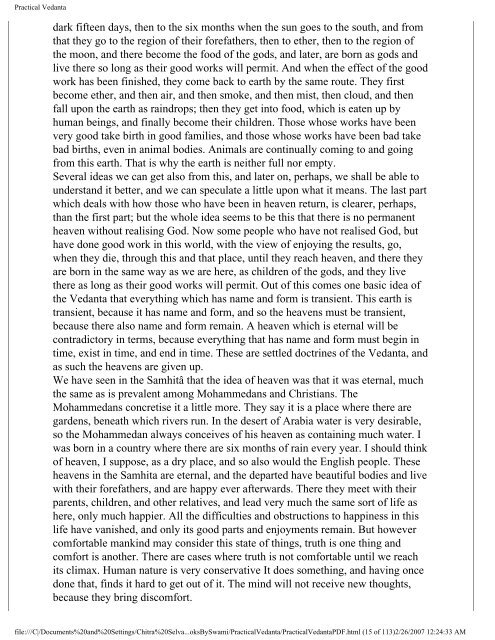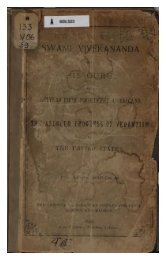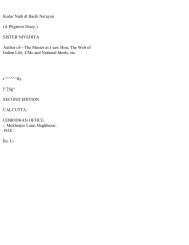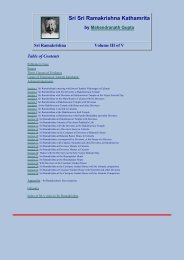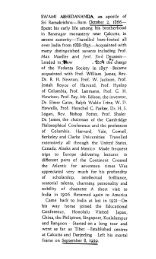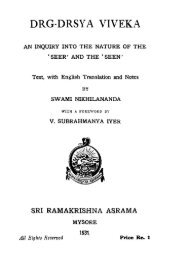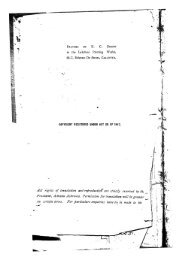<strong>Practical</strong> <strong>Vedanta</strong>teach him. "The other world, O Gautama, is the fire. The sun is its fuel. The raysare the smoke. The day is the flame. The moon is the embers. And the stars are thesparks. In this fire the gods pour libation of faith and from this libation king Somais born." So on he goes. "You need not make oblation to that little fire: the wholeworld is that fire, and this oblation, this worship, is continually going on. Thegods, and the angels, and everybody is worshipping it. Man is the greatest symbolof fire, the body of man." Here also we see the ideal becoming practical andBrahman is seen in everything. The principle that underlies all these stories is thatinvented symbolism may be good and helpful, but already better symbols existthan any we can invent. You may invent an image through which to worship God,but a better image already exists, the living man. You may build a temple in whichto worship God, and that may be good, but a better one, a much higher one,already exists, the human body.You remember that the Vedas have two parts, the ceremonial and the knowledgeportions. In time ceremonials had multiplied and become so intricate that it wasalmost hopeless to disentangle them, and so in the Upanishads we find that theceremonials are almost done away with, but gently, by explaining them. We seethat in old times they had these oblations and sacrifices, then the philosopherscame, and instead of snatching away the symbols from the hands of the ignorant,instead of taking the negative position, which we unfortunately find so general inmodern reforms, they gave them something to take their place. "Here is thesymbol of fire," they said. "Very good! But here is another symbol, the earth.What a grand, great symbol! Here is this little temple, but the whole universe is atemple; a man can worship anywhere. There are the peculiar figures that men drawon the earth, and there are the altars, but here is the greatest of altars, the living,conscious human body, and to worship at this altar is far higher than the worshipof any dead symbols."We now come to a peculiar doctrine. I do not understand much of it myself. If youcan make something out of it, I will read it to you. When a man dies, who has bymeditation purified himself and got knowledge, he first goes to light, then fromlight to day, from day to the light half of the moon, from that to the six monthswhen the sun goes to the north, from that to the year, from the year to the sun,from the sun to the moon, from the moon to the lightning, and when he comes tothe sphere of lightning, he meets a person who is not human, and that person leadshim to (the conditioned) Brahman. This is the way of the gods. When sages andwise persons die, they go that way and they do not return. What is meant by thismonth and year, and all these things, no one understands clearly. Each one giveshis own meaning, and some say it is all nonsense. What is meant by going to theworld of the moon and of the sun, and this person who comes to help the soul afterit has reached the sphere of lightning, no one knows. There is an idea among theHindus that the moon is a place where life exists, and we shall see how life hascome from there. Those that have not attained to knowledge, but have done goodwork in this life, first go, when they die, through smoke, then to night, then to thefile:///C|/Documents%20and%20Settings/Chitra%20Selva...oksBySwami/<strong>Practical</strong><strong>Vedanta</strong>/<strong>Practical</strong><strong>Vedanta</strong>PDF.html (14 of 113)2/26/2007 12:24:33 AM
<strong>Practical</strong> <strong>Vedanta</strong>dark fifteen days, then to the six months when the sun goes to the south, and fromthat they go to the region of their forefathers, then to ether, then to the region ofthe moon, and there become the food of the gods, and later, are born as gods andlive there so long as their good works will permit. And when the effect of the goodwork has been finished, they come back to earth by the same route. They firstbecome ether, and then air, and then smoke, and then mist, then cloud, and thenfall upon the earth as raindrops; then they get into food, which is eaten up byhuman beings, and finally become their children. Those whose works have beenvery good take birth in good families, and those whose works have been bad takebad births, even in animal bodies. Animals are continually coming to and goingfrom this earth. That is why the earth is neither full nor empty.Several ideas we can get also from this, and later on, perhaps, we shall be able tounderstand it better, and we can speculate a little upon what it means. The last partwhich deals with how those who have been in heaven return, is clearer, perhaps,than the first part; but the whole idea seems to be this that there is no permanentheaven without realising God. Now some people who have not realised God, buthave done good work in this world, with the view of enjoying the results, go,when they die, through this and that place, until they reach heaven, and there theyare born in the same way as we are here, as children of the gods, and they livethere as long as their good works will permit. Out of this comes one basic idea ofthe <strong>Vedanta</strong> that everything which has name and form is transient. This earth istransient, because it has name and form, and so the heavens must be transient,because there also name and form remain. A heaven which is eternal will becontradictory in terms, because everything that has name and form must begin intime, exist in time, and end in time. These are settled doctrines of the <strong>Vedanta</strong>, andas such the heavens are given up.We have seen in the Samhitâ that the idea of heaven was that it was eternal, muchthe same as is prevalent among Mohammedans and Christians. TheMohammedans concretise it a little more. They say it is a place where there aregardens, beneath which rivers run. In the desert of Arabia water is very desirable,so the Mohammedan always conceives of his heaven as containing much water. Iwas born in a country where there are six months of rain every year. I should thinkof heaven, I suppose, as a dry place, and so also would the English people. Theseheavens in the Samhita are eternal, and the departed have beautiful bodies and livewith their forefathers, and are happy ever afterwards. There they meet with theirparents, children, and other relatives, and lead very much the same sort of life ashere, only much happier. All the difficulties and obstructions to happiness in thislife have vanished, and only its good parts and enjoyments remain. But howevercomfortable mankind may consider this state of things, truth is one thing andcomfort is another. There are cases where truth is not comfortable until we reachits climax. Human nature is very conservative It does something, and having oncedone that, finds it hard to get out of it. The mind will not receive new thoughts,because they bring discomfort.file:///C|/Documents%20and%20Settings/Chitra%20Selva...oksBySwami/<strong>Practical</strong><strong>Vedanta</strong>/<strong>Practical</strong><strong>Vedanta</strong>PDF.html (15 of 113)2/26/2007 12:24:33 AM
- Page 1 and 2: Practical VedantaPractical VedantaP
- Page 3 and 4: Practical Vedantaworld. If I am a s
- Page 5 and 6: Practical Vedantadifference is only
- Page 7 and 8: Practical VedantaThe ideal of faith
- Page 9 and 10: Practical Vedantamoment of our live
- Page 11 and 12: Practical Vedantaof the Christs and
- Page 13: Practical Vedanta"This life is Brah
- Page 17 and 18: Practical Vedantalife. This is the
- Page 19 and 20: Practical Vedantaeverything would b
- Page 21 and 22: Practical Vedantait is only through
- Page 23 and 24: Practical Vedantawhich is that subt
- Page 25 and 26: Practical Vedantanoumenon and pheno
- Page 27 and 28: Practical Vedantato which is the be
- Page 29 and 30: Practical VedantaAbsolute.The finit
- Page 31 and 32: Practical Vedantawhich is not the q
- Page 33 and 34: Practical Vedantaexperience that th
- Page 35 and 36: Practical Vedantafulfilled. The Jiv
- Page 37 and 38: Practical Vedantabetween the pure r
- Page 39 and 40: Practical Vedantacome out straight.
- Page 41 and 42: Practical Vedantawar with one anoth
- Page 43 and 44: Practical Vedantanobody could under
- Page 45 and 46: Practical VedantaMy idea, therefore
- Page 47 and 48: Practical Vedantathe same methods.
- Page 49 and 50: Practical Vedantavarious minds, all
- Page 51 and 52: Practical Vedantabrotherhood; but t
- Page 53 and 54: Practical Vedantabrotherhood, but w
- Page 55 and 56: Practical Vedantawe all go with ves
- Page 57 and 58: Practical Vedantareason. What can y
- Page 59 and 60: Practical Vedantabeen preached in t
- Page 61 and 62: Practical Vedantathe husband kisses
- Page 63 and 64: Practical Vedantaof the knowledge a
- Page 65 and 66:
Practical Vedantafor those who only
- Page 67 and 68:
Practical Vedantasun exists because
- Page 69 and 70:
Practical Vedantaof death was pleas
- Page 71 and 72:
Practical VedantaGod. We must learn
- Page 73 and 74:
Practical Vedantaa plague comes, it
- Page 75 and 76:
Practical VedantaAtman? "As with a
- Page 77 and 78:
Practical Vedantathat immortal One,
- Page 79 and 80:
Practical Vedantaand the third egoi
- Page 81 and 82:
Practical VedantaWitness of the uni
- Page 83 and 84:
Practical VedantaPractical Vedanta1
- Page 85 and 86:
Practical Vedantaeternal ; every ot
- Page 87 and 88:
Practical Vedantafaculty, Buddhi, w
- Page 89 and 90:
Practical VedantaPractical Vedanta1
- Page 91 and 92:
Practical Vedantastepping-stone to
- Page 93 and 94:
Practical Vedantarecognition? Findi
- Page 95 and 96:
Practical Vedantasentient." This is
- Page 97 and 98:
Practical Vedantaessentially differ
- Page 99 and 100:
Practical Vedantaexistence is limit
- Page 101 and 102:
Practical Vedantalive, for I am lif
- Page 103 and 104:
Practical Vedantasee from Kapila's
- Page 105 and 106:
Practical Vedantalimitation, but th
- Page 107 and 108:
Practical Vedantaperfect, infinite,
- Page 109 and 110:
Practical Vedantaindividuality, of
- Page 111 and 112:
Practical Vedantarepeat [something]
- Page 113:
Practical Vedantaperson who dies in


